Microeconomics: Evaluating Cashless Debit Card in Australia (2024)
VerifiedAdded on 2023/01/20
|8
|2000
|94
Essay
AI Summary
This microeconomics essay examines the Australian government's use of cashless debit cards as a welfare income management tool, focusing on its impact on reducing community harm caused by alcohol consumption and gambling. The essay explores the socioeconomic factors, particularly in vulnerable communities, and the card's role in restricting spending on non-essential items to promote responsible financial behavior. It presents both the positive effects, such as reduced addiction rates and improved child welfare, and the counterarguments, including restrictions on spending freedom and potential violations of human rights. The analysis includes the ethical frameworks of responsibility and accountability, alongside discussions on social effects, unemployment, and the card's limitations. The essay concludes by considering the justifiability of the policy, alternative approaches, and the need for comprehensive policies to address underlying socioeconomic issues like poverty and unemployment, emphasizing the importance of education and support for struggling families. The assignment includes references to relevant literature supporting the arguments.
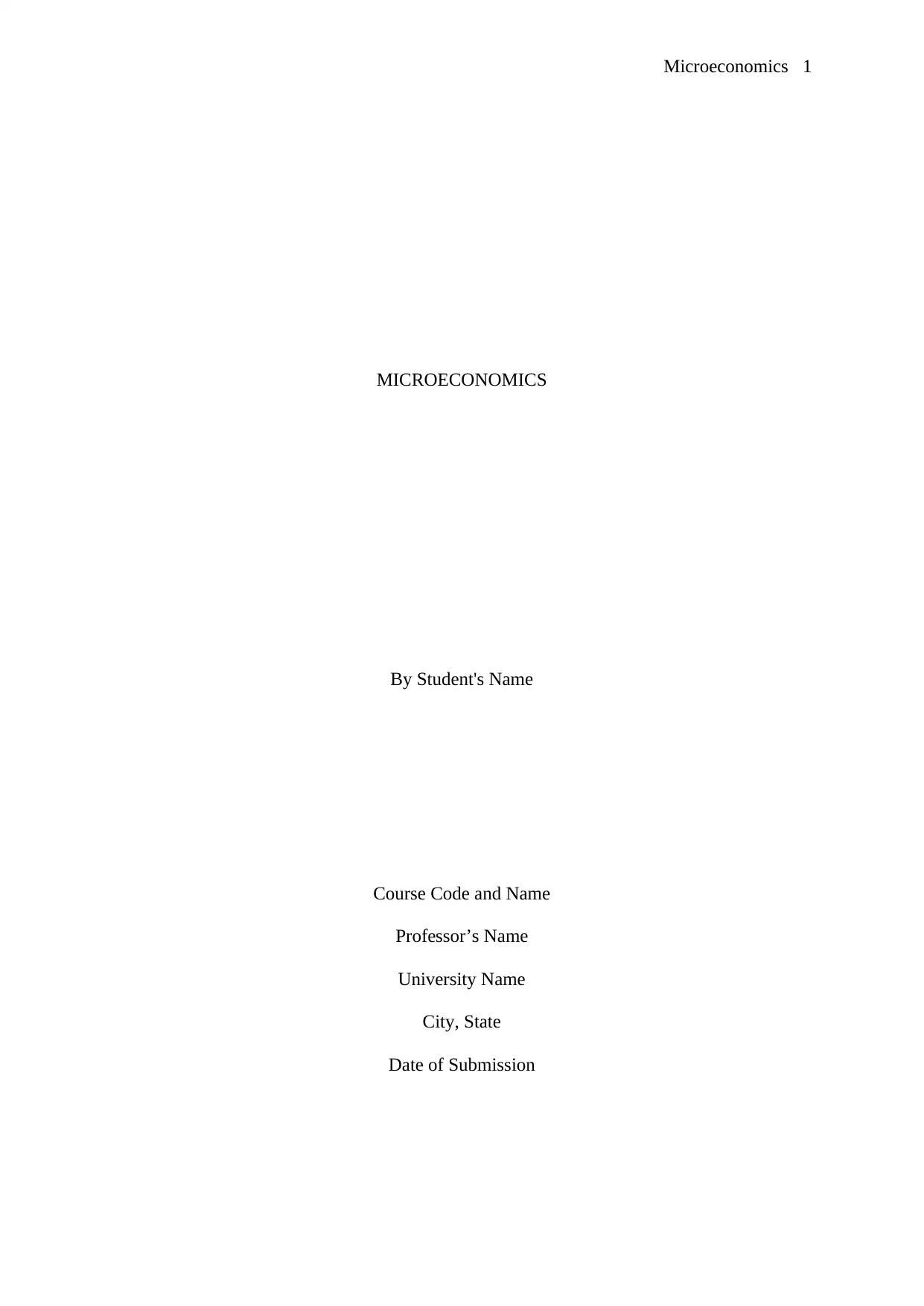
Microeconomics 1
MICROECONOMICS
By Student's Name
Course Code and Name
Professor’s Name
University Name
City, State
Date of Submission
MICROECONOMICS
By Student's Name
Course Code and Name
Professor’s Name
University Name
City, State
Date of Submission
Paraphrase This Document
Need a fresh take? Get an instant paraphrase of this document with our AI Paraphraser
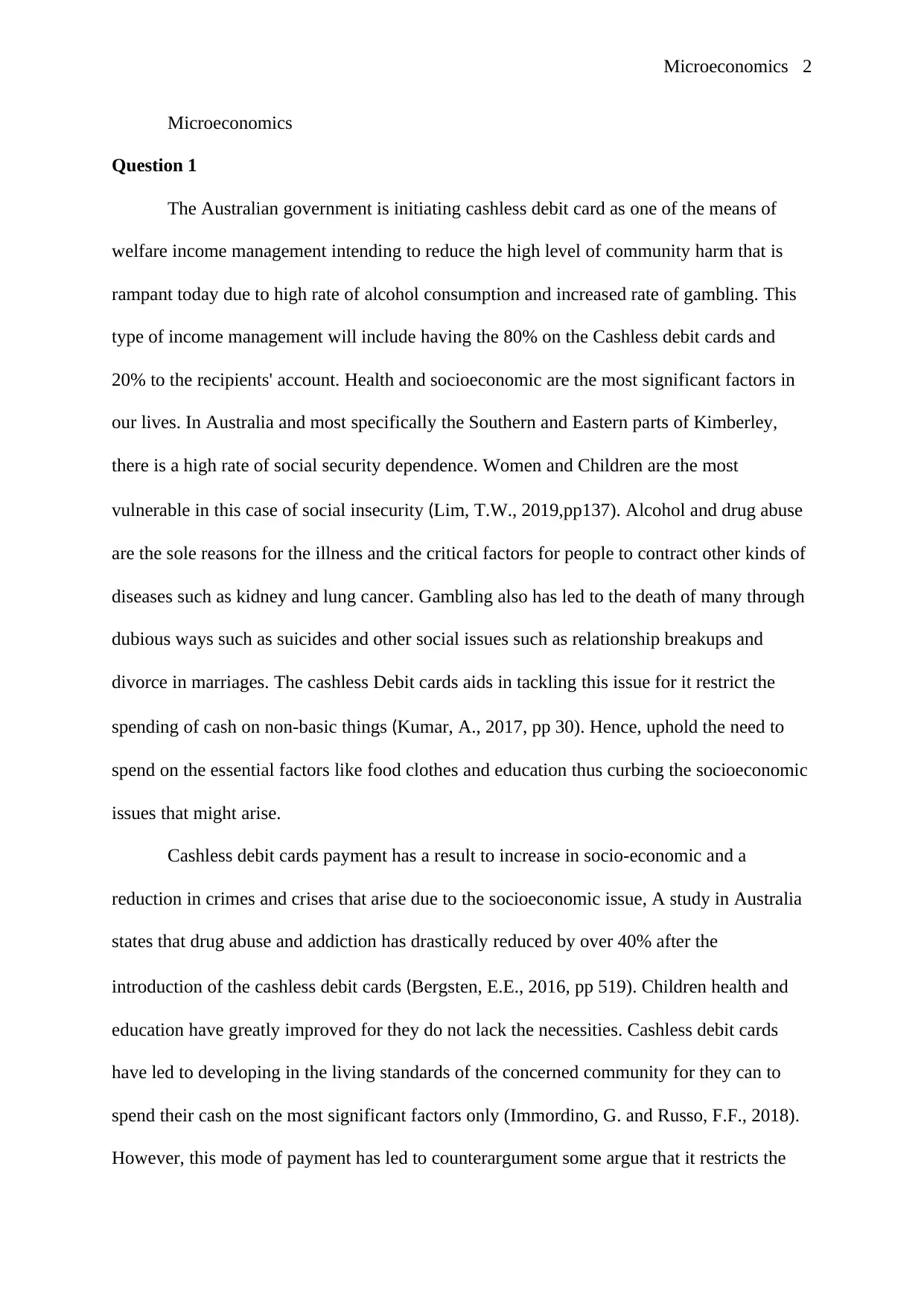
Microeconomics 2
Microeconomics
Question 1
The Australian government is initiating cashless debit card as one of the means of
welfare income management intending to reduce the high level of community harm that is
rampant today due to high rate of alcohol consumption and increased rate of gambling. This
type of income management will include having the 80% on the Cashless debit cards and
20% to the recipients' account. Health and socioeconomic are the most significant factors in
our lives. In Australia and most specifically the Southern and Eastern parts of Kimberley,
there is a high rate of social security dependence. Women and Children are the most
vulnerable in this case of social insecurity (Lim, T.W., 2019,pp137). Alcohol and drug abuse
are the sole reasons for the illness and the critical factors for people to contract other kinds of
diseases such as kidney and lung cancer. Gambling also has led to the death of many through
dubious ways such as suicides and other social issues such as relationship breakups and
divorce in marriages. The cashless Debit cards aids in tackling this issue for it restrict the
spending of cash on non-basic things (Kumar, A., 2017, pp 30). Hence, uphold the need to
spend on the essential factors like food clothes and education thus curbing the socioeconomic
issues that might arise.
Cashless debit cards payment has a result to increase in socio-economic and a
reduction in crimes and crises that arise due to the socioeconomic issue, A study in Australia
states that drug abuse and addiction has drastically reduced by over 40% after the
introduction of the cashless debit cards (Bergsten, E.E., 2016, pp 519). Children health and
education have greatly improved for they do not lack the necessities. Cashless debit cards
have led to developing in the living standards of the concerned community for they can to
spend their cash on the most significant factors only (Immordino, G. and Russo, F.F., 2018).
However, this mode of payment has led to counterargument some argue that it restricts the
Microeconomics
Question 1
The Australian government is initiating cashless debit card as one of the means of
welfare income management intending to reduce the high level of community harm that is
rampant today due to high rate of alcohol consumption and increased rate of gambling. This
type of income management will include having the 80% on the Cashless debit cards and
20% to the recipients' account. Health and socioeconomic are the most significant factors in
our lives. In Australia and most specifically the Southern and Eastern parts of Kimberley,
there is a high rate of social security dependence. Women and Children are the most
vulnerable in this case of social insecurity (Lim, T.W., 2019,pp137). Alcohol and drug abuse
are the sole reasons for the illness and the critical factors for people to contract other kinds of
diseases such as kidney and lung cancer. Gambling also has led to the death of many through
dubious ways such as suicides and other social issues such as relationship breakups and
divorce in marriages. The cashless Debit cards aids in tackling this issue for it restrict the
spending of cash on non-basic things (Kumar, A., 2017, pp 30). Hence, uphold the need to
spend on the essential factors like food clothes and education thus curbing the socioeconomic
issues that might arise.
Cashless debit cards payment has a result to increase in socio-economic and a
reduction in crimes and crises that arise due to the socioeconomic issue, A study in Australia
states that drug abuse and addiction has drastically reduced by over 40% after the
introduction of the cashless debit cards (Bergsten, E.E., 2016, pp 519). Children health and
education have greatly improved for they do not lack the necessities. Cashless debit cards
have led to developing in the living standards of the concerned community for they can to
spend their cash on the most significant factors only (Immordino, G. and Russo, F.F., 2018).
However, this mode of payment has led to counterargument some argue that it restricts the
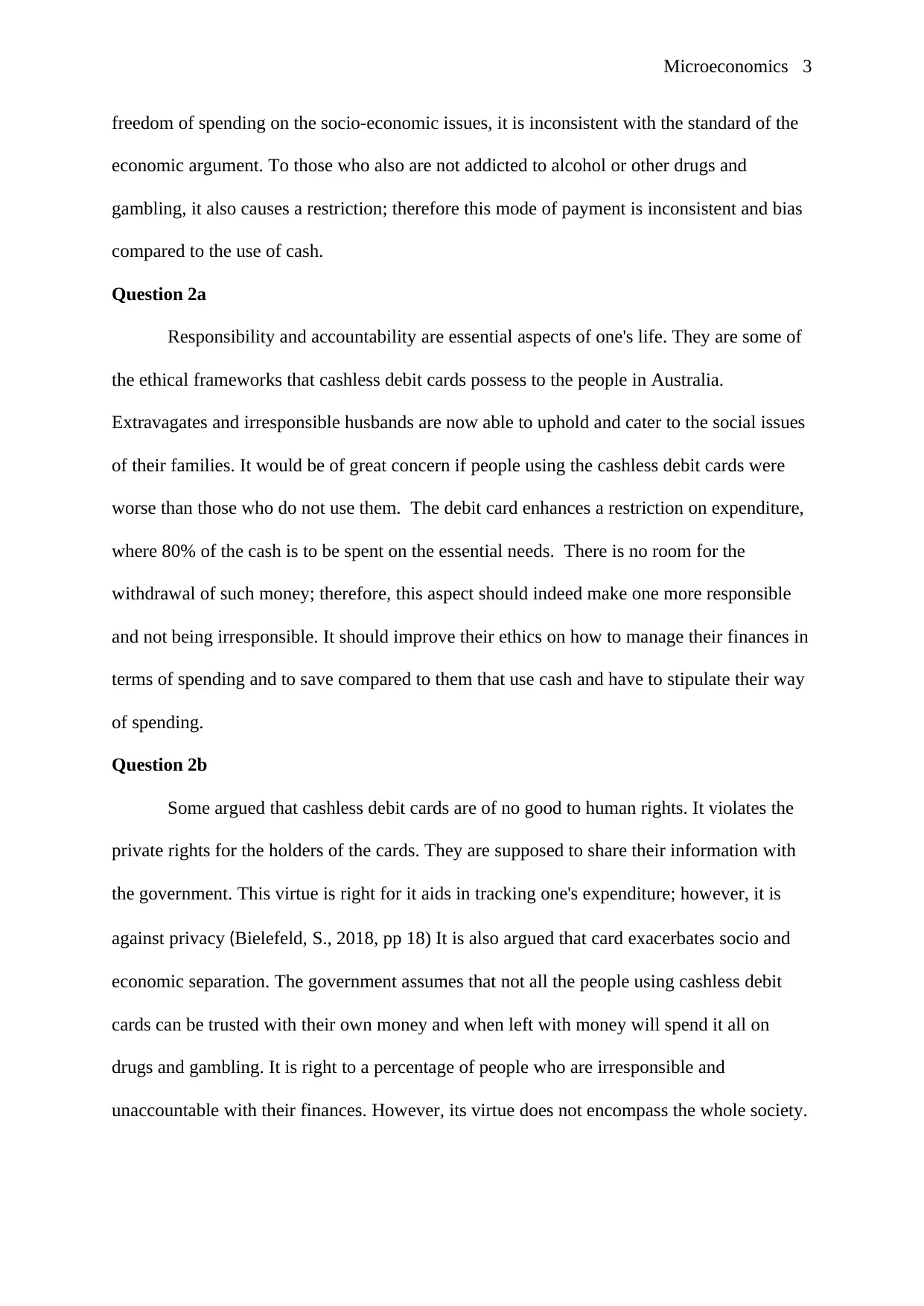
Microeconomics 3
freedom of spending on the socio-economic issues, it is inconsistent with the standard of the
economic argument. To those who also are not addicted to alcohol or other drugs and
gambling, it also causes a restriction; therefore this mode of payment is inconsistent and bias
compared to the use of cash.
Question 2a
Responsibility and accountability are essential aspects of one's life. They are some of
the ethical frameworks that cashless debit cards possess to the people in Australia.
Extravagates and irresponsible husbands are now able to uphold and cater to the social issues
of their families. It would be of great concern if people using the cashless debit cards were
worse than those who do not use them. The debit card enhances a restriction on expenditure,
where 80% of the cash is to be spent on the essential needs. There is no room for the
withdrawal of such money; therefore, this aspect should indeed make one more responsible
and not being irresponsible. It should improve their ethics on how to manage their finances in
terms of spending and to save compared to them that use cash and have to stipulate their way
of spending.
Question 2b
Some argued that cashless debit cards are of no good to human rights. It violates the
private rights for the holders of the cards. They are supposed to share their information with
the government. This virtue is right for it aids in tracking one's expenditure; however, it is
against privacy (Bielefeld, S., 2018, pp 18) It is also argued that card exacerbates socio and
economic separation. The government assumes that not all the people using cashless debit
cards can be trusted with their own money and when left with money will spend it all on
drugs and gambling. It is right to a percentage of people who are irresponsible and
unaccountable with their finances. However, its virtue does not encompass the whole society.
freedom of spending on the socio-economic issues, it is inconsistent with the standard of the
economic argument. To those who also are not addicted to alcohol or other drugs and
gambling, it also causes a restriction; therefore this mode of payment is inconsistent and bias
compared to the use of cash.
Question 2a
Responsibility and accountability are essential aspects of one's life. They are some of
the ethical frameworks that cashless debit cards possess to the people in Australia.
Extravagates and irresponsible husbands are now able to uphold and cater to the social issues
of their families. It would be of great concern if people using the cashless debit cards were
worse than those who do not use them. The debit card enhances a restriction on expenditure,
where 80% of the cash is to be spent on the essential needs. There is no room for the
withdrawal of such money; therefore, this aspect should indeed make one more responsible
and not being irresponsible. It should improve their ethics on how to manage their finances in
terms of spending and to save compared to them that use cash and have to stipulate their way
of spending.
Question 2b
Some argued that cashless debit cards are of no good to human rights. It violates the
private rights for the holders of the cards. They are supposed to share their information with
the government. This virtue is right for it aids in tracking one's expenditure; however, it is
against privacy (Bielefeld, S., 2018, pp 18) It is also argued that card exacerbates socio and
economic separation. The government assumes that not all the people using cashless debit
cards can be trusted with their own money and when left with money will spend it all on
drugs and gambling. It is right to a percentage of people who are irresponsible and
unaccountable with their finances. However, its virtue does not encompass the whole society.
⊘ This is a preview!⊘
Do you want full access?
Subscribe today to unlock all pages.

Trusted by 1+ million students worldwide
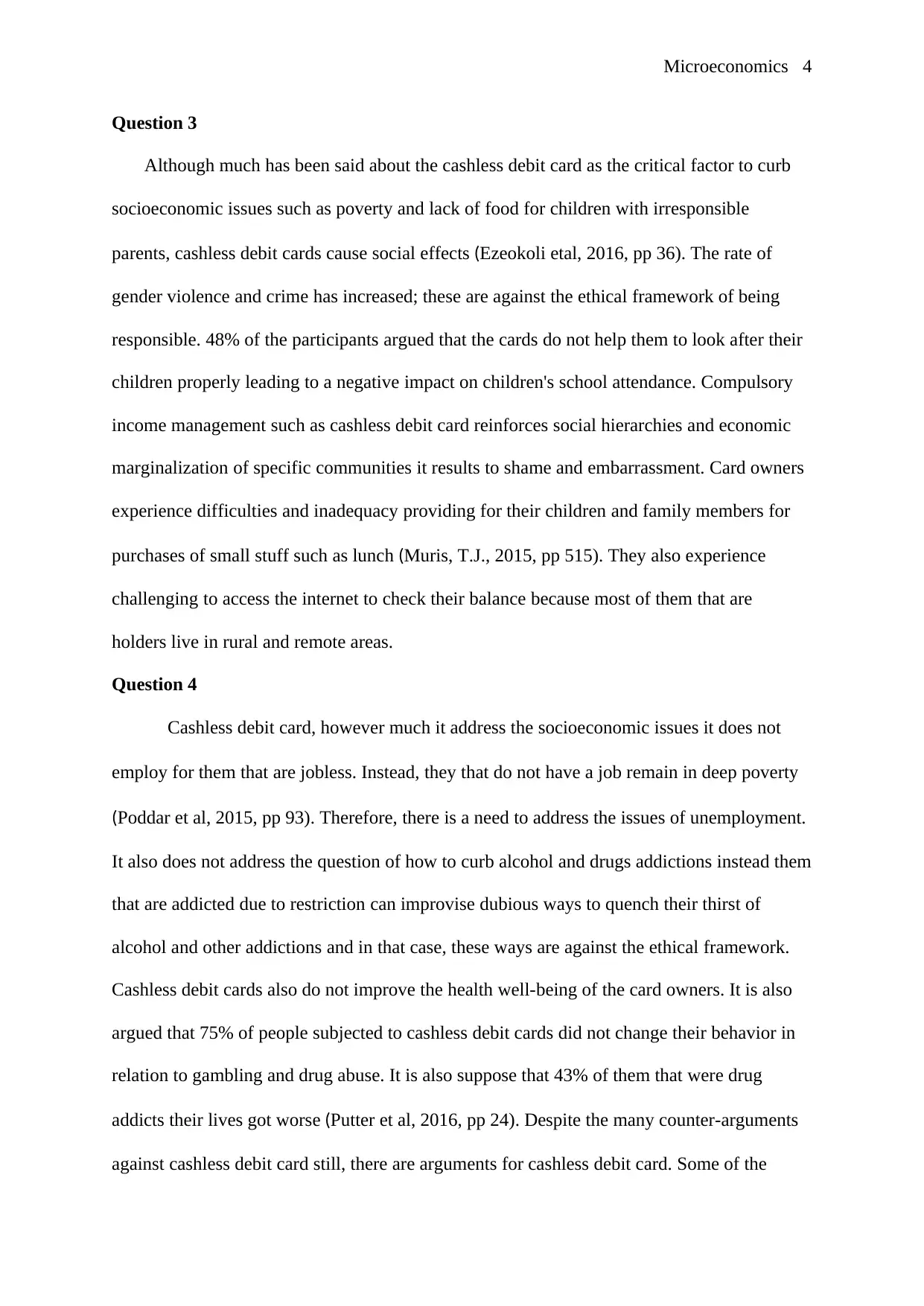
Microeconomics 4
Question 3
Although much has been said about the cashless debit card as the critical factor to curb
socioeconomic issues such as poverty and lack of food for children with irresponsible
parents, cashless debit cards cause social effects (Ezeokoli etal, 2016, pp 36). The rate of
gender violence and crime has increased; these are against the ethical framework of being
responsible. 48% of the participants argued that the cards do not help them to look after their
children properly leading to a negative impact on children's school attendance. Compulsory
income management such as cashless debit card reinforces social hierarchies and economic
marginalization of specific communities it results to shame and embarrassment. Card owners
experience difficulties and inadequacy providing for their children and family members for
purchases of small stuff such as lunch (Muris, T.J., 2015, pp 515). They also experience
challenging to access the internet to check their balance because most of them that are
holders live in rural and remote areas.
Question 4
Cashless debit card, however much it address the socioeconomic issues it does not
employ for them that are jobless. Instead, they that do not have a job remain in deep poverty
(Poddar et al, 2015, pp 93). Therefore, there is a need to address the issues of unemployment.
It also does not address the question of how to curb alcohol and drugs addictions instead them
that are addicted due to restriction can improvise dubious ways to quench their thirst of
alcohol and other addictions and in that case, these ways are against the ethical framework.
Cashless debit cards also do not improve the health well-being of the card owners. It is also
argued that 75% of people subjected to cashless debit cards did not change their behavior in
relation to gambling and drug abuse. It is also suppose that 43% of them that were drug
addicts their lives got worse (Putter et al, 2016, pp 24). Despite the many counter-arguments
against cashless debit card still, there are arguments for cashless debit card. Some of the
Question 3
Although much has been said about the cashless debit card as the critical factor to curb
socioeconomic issues such as poverty and lack of food for children with irresponsible
parents, cashless debit cards cause social effects (Ezeokoli etal, 2016, pp 36). The rate of
gender violence and crime has increased; these are against the ethical framework of being
responsible. 48% of the participants argued that the cards do not help them to look after their
children properly leading to a negative impact on children's school attendance. Compulsory
income management such as cashless debit card reinforces social hierarchies and economic
marginalization of specific communities it results to shame and embarrassment. Card owners
experience difficulties and inadequacy providing for their children and family members for
purchases of small stuff such as lunch (Muris, T.J., 2015, pp 515). They also experience
challenging to access the internet to check their balance because most of them that are
holders live in rural and remote areas.
Question 4
Cashless debit card, however much it address the socioeconomic issues it does not
employ for them that are jobless. Instead, they that do not have a job remain in deep poverty
(Poddar et al, 2015, pp 93). Therefore, there is a need to address the issues of unemployment.
It also does not address the question of how to curb alcohol and drugs addictions instead them
that are addicted due to restriction can improvise dubious ways to quench their thirst of
alcohol and other addictions and in that case, these ways are against the ethical framework.
Cashless debit cards also do not improve the health well-being of the card owners. It is also
argued that 75% of people subjected to cashless debit cards did not change their behavior in
relation to gambling and drug abuse. It is also suppose that 43% of them that were drug
addicts their lives got worse (Putter et al, 2016, pp 24). Despite the many counter-arguments
against cashless debit card still, there are arguments for cashless debit card. Some of the
Paraphrase This Document
Need a fresh take? Get an instant paraphrase of this document with our AI Paraphraser
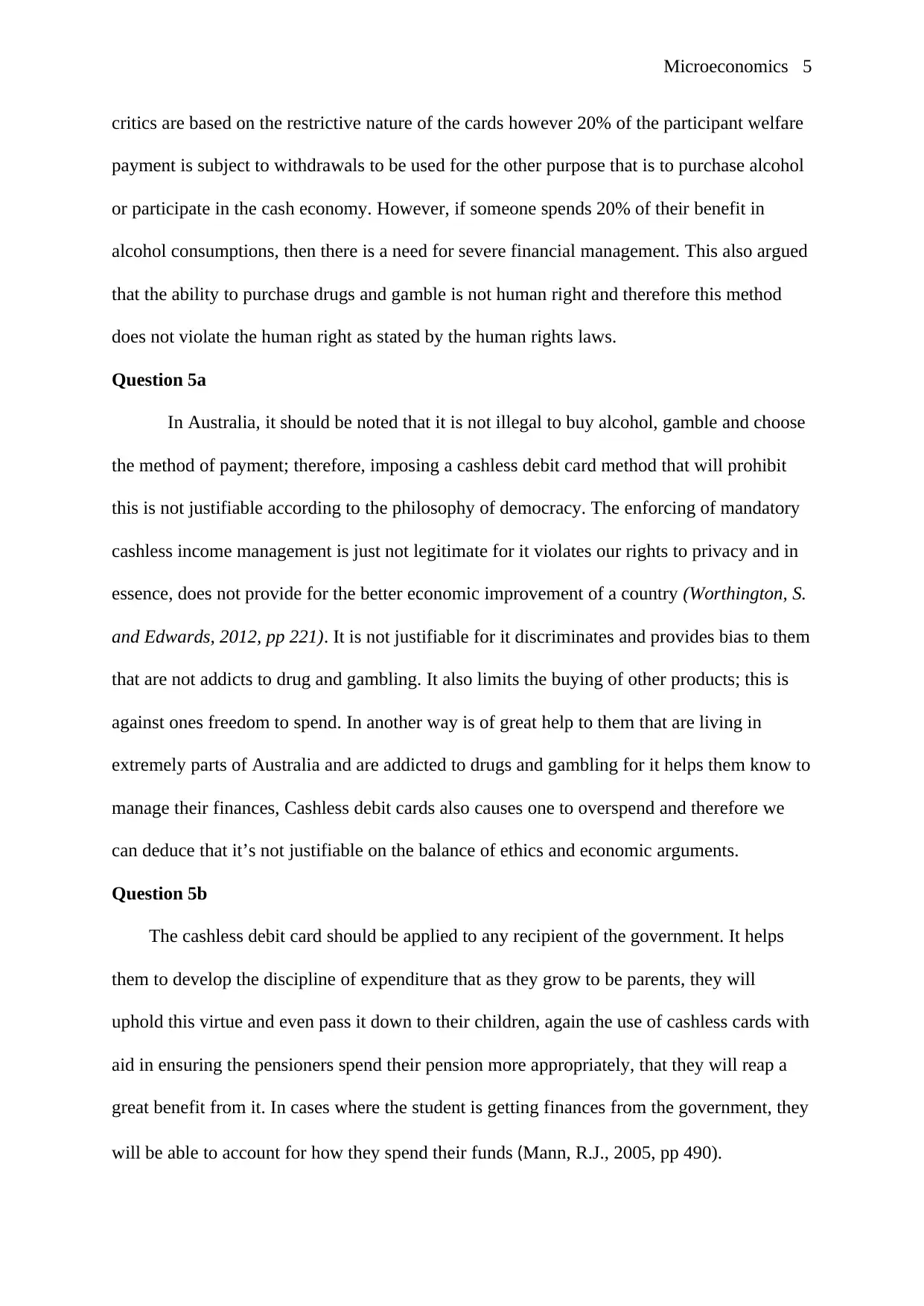
Microeconomics 5
critics are based on the restrictive nature of the cards however 20% of the participant welfare
payment is subject to withdrawals to be used for the other purpose that is to purchase alcohol
or participate in the cash economy. However, if someone spends 20% of their benefit in
alcohol consumptions, then there is a need for severe financial management. This also argued
that the ability to purchase drugs and gamble is not human right and therefore this method
does not violate the human right as stated by the human rights laws.
Question 5a
In Australia, it should be noted that it is not illegal to buy alcohol, gamble and choose
the method of payment; therefore, imposing a cashless debit card method that will prohibit
this is not justifiable according to the philosophy of democracy. The enforcing of mandatory
cashless income management is just not legitimate for it violates our rights to privacy and in
essence, does not provide for the better economic improvement of a country (Worthington, S.
and Edwards, 2012, pp 221). It is not justifiable for it discriminates and provides bias to them
that are not addicts to drug and gambling. It also limits the buying of other products; this is
against ones freedom to spend. In another way is of great help to them that are living in
extremely parts of Australia and are addicted to drugs and gambling for it helps them know to
manage their finances, Cashless debit cards also causes one to overspend and therefore we
can deduce that it’s not justifiable on the balance of ethics and economic arguments.
Question 5b
The cashless debit card should be applied to any recipient of the government. It helps
them to develop the discipline of expenditure that as they grow to be parents, they will
uphold this virtue and even pass it down to their children, again the use of cashless cards with
aid in ensuring the pensioners spend their pension more appropriately, that they will reap a
great benefit from it. In cases where the student is getting finances from the government, they
will be able to account for how they spend their funds (Mann, R.J., 2005, pp 490).
critics are based on the restrictive nature of the cards however 20% of the participant welfare
payment is subject to withdrawals to be used for the other purpose that is to purchase alcohol
or participate in the cash economy. However, if someone spends 20% of their benefit in
alcohol consumptions, then there is a need for severe financial management. This also argued
that the ability to purchase drugs and gamble is not human right and therefore this method
does not violate the human right as stated by the human rights laws.
Question 5a
In Australia, it should be noted that it is not illegal to buy alcohol, gamble and choose
the method of payment; therefore, imposing a cashless debit card method that will prohibit
this is not justifiable according to the philosophy of democracy. The enforcing of mandatory
cashless income management is just not legitimate for it violates our rights to privacy and in
essence, does not provide for the better economic improvement of a country (Worthington, S.
and Edwards, 2012, pp 221). It is not justifiable for it discriminates and provides bias to them
that are not addicts to drug and gambling. It also limits the buying of other products; this is
against ones freedom to spend. In another way is of great help to them that are living in
extremely parts of Australia and are addicted to drugs and gambling for it helps them know to
manage their finances, Cashless debit cards also causes one to overspend and therefore we
can deduce that it’s not justifiable on the balance of ethics and economic arguments.
Question 5b
The cashless debit card should be applied to any recipient of the government. It helps
them to develop the discipline of expenditure that as they grow to be parents, they will
uphold this virtue and even pass it down to their children, again the use of cashless cards with
aid in ensuring the pensioners spend their pension more appropriately, that they will reap a
great benefit from it. In cases where the student is getting finances from the government, they
will be able to account for how they spend their funds (Mann, R.J., 2005, pp 490).
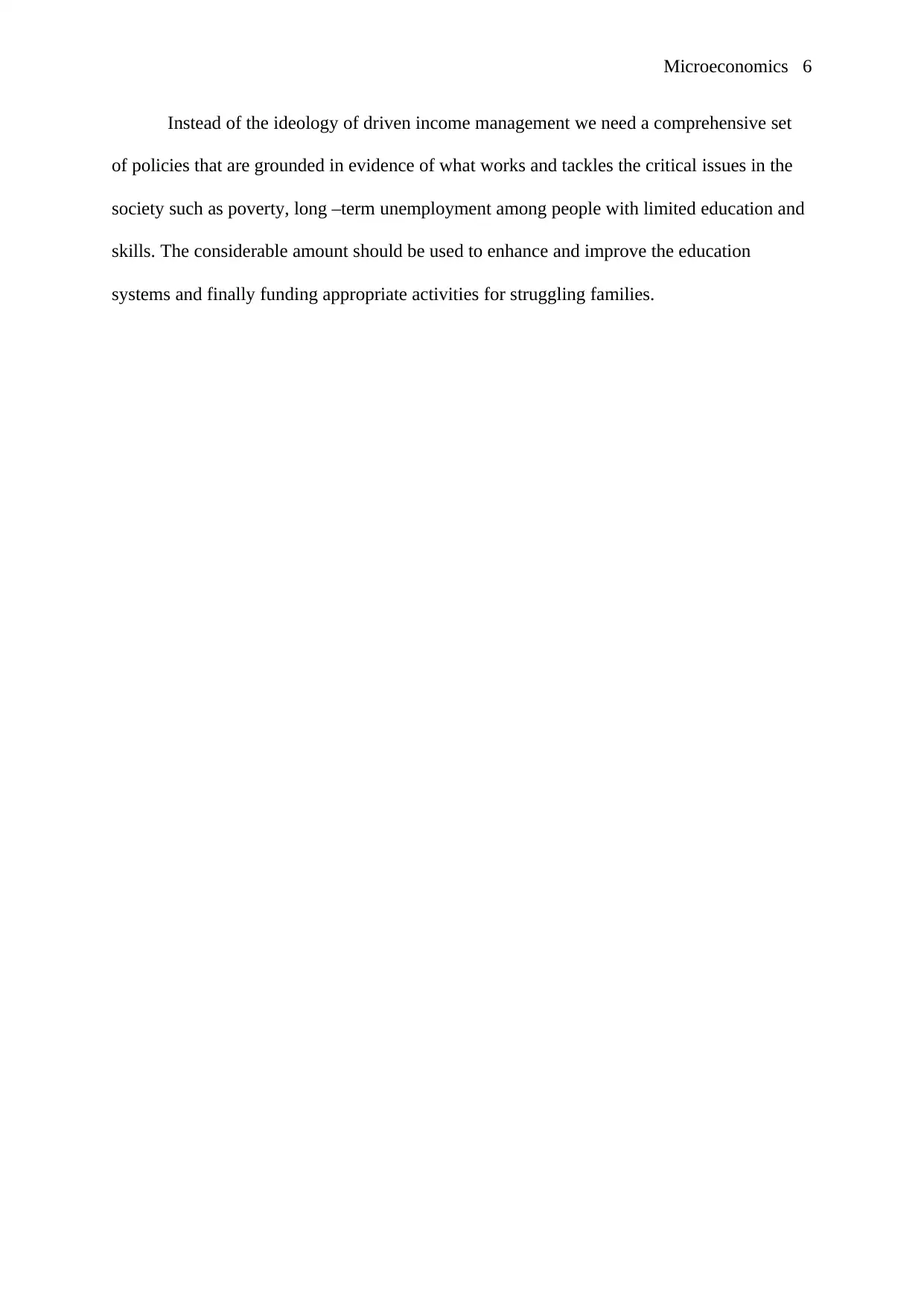
Microeconomics 6
Instead of the ideology of driven income management we need a comprehensive set
of policies that are grounded in evidence of what works and tackles the critical issues in the
society such as poverty, long –term unemployment among people with limited education and
skills. The considerable amount should be used to enhance and improve the education
systems and finally funding appropriate activities for struggling families.
Instead of the ideology of driven income management we need a comprehensive set
of policies that are grounded in evidence of what works and tackles the critical issues in the
society such as poverty, long –term unemployment among people with limited education and
skills. The considerable amount should be used to enhance and improve the education
systems and finally funding appropriate activities for struggling families.
⊘ This is a preview!⊘
Do you want full access?
Subscribe today to unlock all pages.

Trusted by 1+ million students worldwide
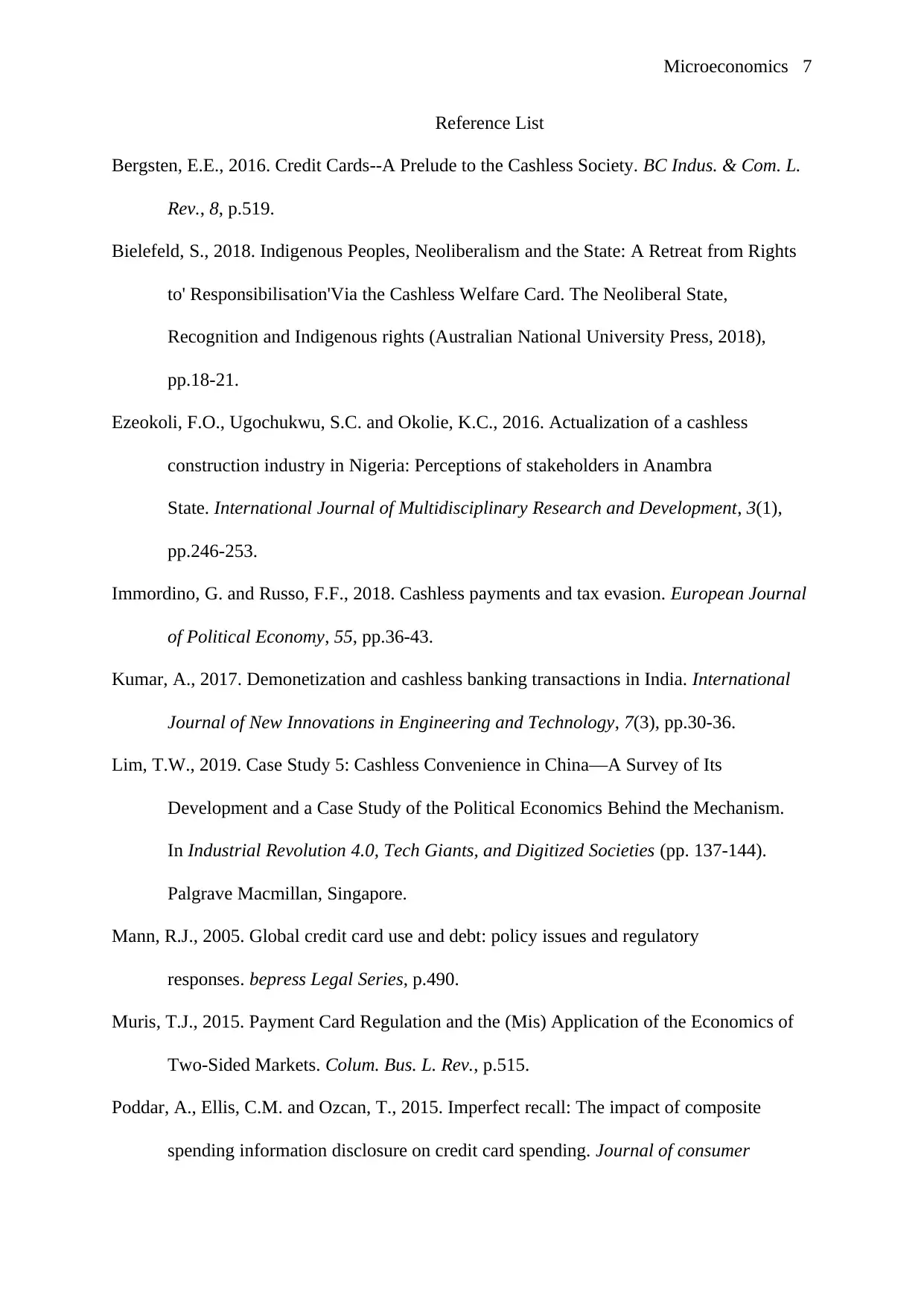
Microeconomics 7
Reference List
Bergsten, E.E., 2016. Credit Cards--A Prelude to the Cashless Society. BC Indus. & Com. L.
Rev., 8, p.519.
Bielefeld, S., 2018. Indigenous Peoples, Neoliberalism and the State: A Retreat from Rights
to' Responsibilisation'Via the Cashless Welfare Card. The Neoliberal State,
Recognition and Indigenous rights (Australian National University Press, 2018),
pp.18-21.
Ezeokoli, F.O., Ugochukwu, S.C. and Okolie, K.C., 2016. Actualization of a cashless
construction industry in Nigeria: Perceptions of stakeholders in Anambra
State. International Journal of Multidisciplinary Research and Development, 3(1),
pp.246-253.
Immordino, G. and Russo, F.F., 2018. Cashless payments and tax evasion. European Journal
of Political Economy, 55, pp.36-43.
Kumar, A., 2017. Demonetization and cashless banking transactions in India. International
Journal of New Innovations in Engineering and Technology, 7(3), pp.30-36.
Lim, T.W., 2019. Case Study 5: Cashless Convenience in China—A Survey of Its
Development and a Case Study of the Political Economics Behind the Mechanism.
In Industrial Revolution 4.0, Tech Giants, and Digitized Societies (pp. 137-144).
Palgrave Macmillan, Singapore.
Mann, R.J., 2005. Global credit card use and debt: policy issues and regulatory
responses. bepress Legal Series, p.490.
Muris, T.J., 2015. Payment Card Regulation and the (Mis) Application of the Economics of
Two-Sided Markets. Colum. Bus. L. Rev., p.515.
Poddar, A., Ellis, C.M. and Ozcan, T., 2015. Imperfect recall: The impact of composite
spending information disclosure on credit card spending. Journal of consumer
Reference List
Bergsten, E.E., 2016. Credit Cards--A Prelude to the Cashless Society. BC Indus. & Com. L.
Rev., 8, p.519.
Bielefeld, S., 2018. Indigenous Peoples, Neoliberalism and the State: A Retreat from Rights
to' Responsibilisation'Via the Cashless Welfare Card. The Neoliberal State,
Recognition and Indigenous rights (Australian National University Press, 2018),
pp.18-21.
Ezeokoli, F.O., Ugochukwu, S.C. and Okolie, K.C., 2016. Actualization of a cashless
construction industry in Nigeria: Perceptions of stakeholders in Anambra
State. International Journal of Multidisciplinary Research and Development, 3(1),
pp.246-253.
Immordino, G. and Russo, F.F., 2018. Cashless payments and tax evasion. European Journal
of Political Economy, 55, pp.36-43.
Kumar, A., 2017. Demonetization and cashless banking transactions in India. International
Journal of New Innovations in Engineering and Technology, 7(3), pp.30-36.
Lim, T.W., 2019. Case Study 5: Cashless Convenience in China—A Survey of Its
Development and a Case Study of the Political Economics Behind the Mechanism.
In Industrial Revolution 4.0, Tech Giants, and Digitized Societies (pp. 137-144).
Palgrave Macmillan, Singapore.
Mann, R.J., 2005. Global credit card use and debt: policy issues and regulatory
responses. bepress Legal Series, p.490.
Muris, T.J., 2015. Payment Card Regulation and the (Mis) Application of the Economics of
Two-Sided Markets. Colum. Bus. L. Rev., p.515.
Poddar, A., Ellis, C.M. and Ozcan, T., 2015. Imperfect recall: The impact of composite
spending information disclosure on credit card spending. Journal of consumer
Paraphrase This Document
Need a fresh take? Get an instant paraphrase of this document with our AI Paraphraser
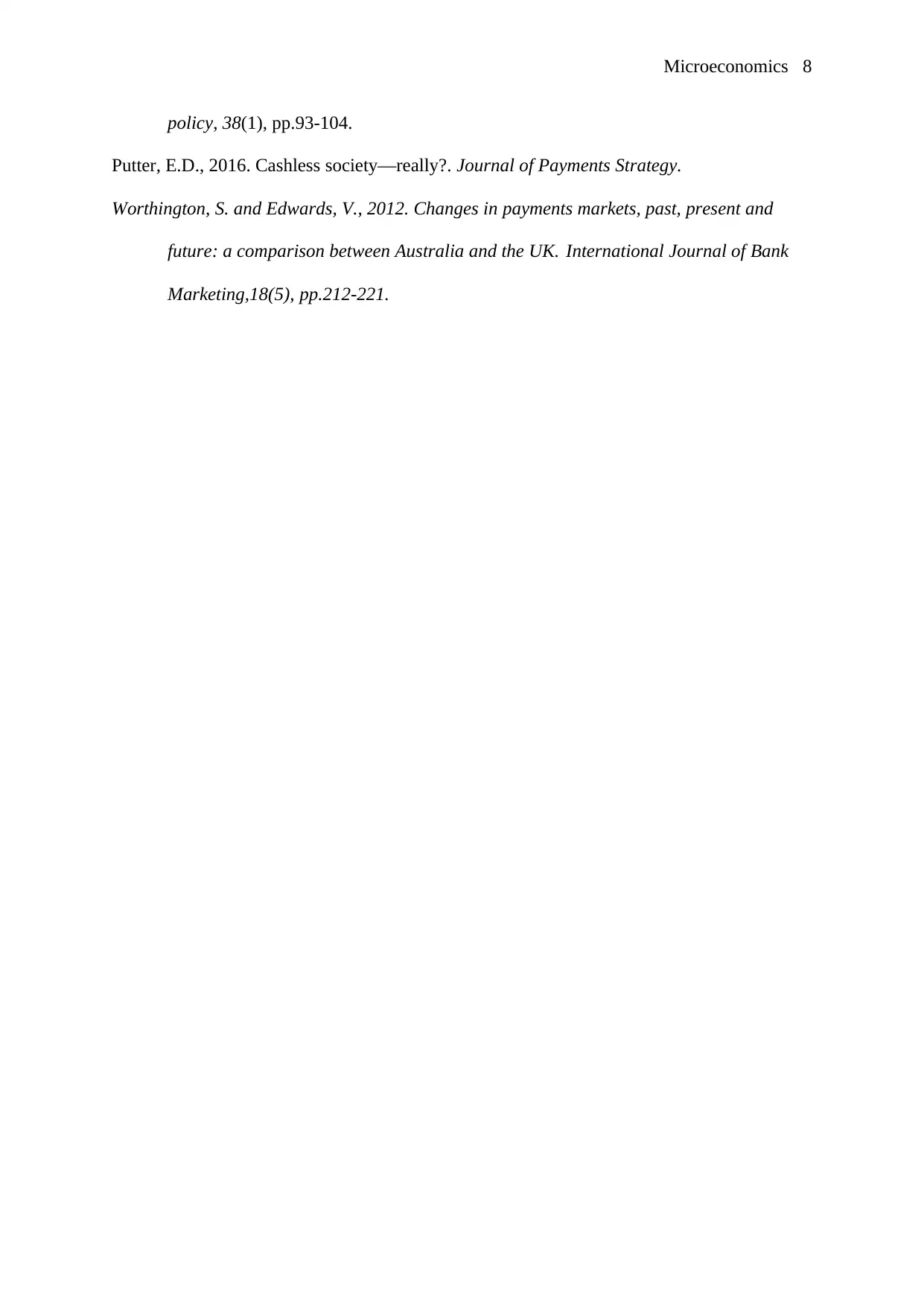
Microeconomics 8
policy, 38(1), pp.93-104.
Putter, E.D., 2016. Cashless society—really?. Journal of Payments Strategy.
Worthington, S. and Edwards, V., 2012. Changes in payments markets, past, present and
future: a comparison between Australia and the UK. International Journal of Bank
Marketing,18(5), pp.212-221.
policy, 38(1), pp.93-104.
Putter, E.D., 2016. Cashless society—really?. Journal of Payments Strategy.
Worthington, S. and Edwards, V., 2012. Changes in payments markets, past, present and
future: a comparison between Australia and the UK. International Journal of Bank
Marketing,18(5), pp.212-221.
1 out of 8
Your All-in-One AI-Powered Toolkit for Academic Success.
+13062052269
info@desklib.com
Available 24*7 on WhatsApp / Email
![[object Object]](/_next/static/media/star-bottom.7253800d.svg)
Unlock your academic potential
Copyright © 2020–2025 A2Z Services. All Rights Reserved. Developed and managed by ZUCOL.


